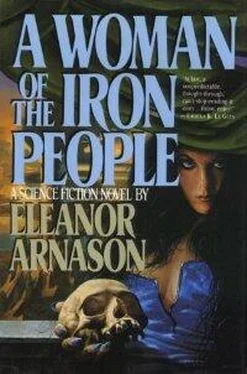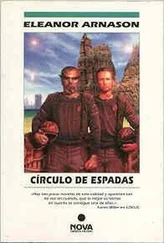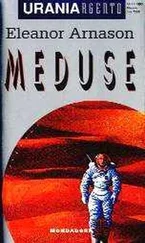“When I think of losing them—it’s like being in space. Nothing is up or down. Nothing is near or far. There’s only darkness and the stars. Then you turn and the ship’s there or the Earth or a station. You are able to orient yourself. But what if you turned and saw nothing? Only more darkness and stars?
“There are no more countries on Earth or anywhere in the solar system. They have—the messages told us—abandoned outmoded categories such as ‘nation.’ They have abandoned outmoded categories such as ‘socialism.’ The ideas of the nineteenth century have a historical interest, but are no longer relevant. It is no longer possible to use the constructs of Marxism. They simply don’t work. That is what the messages said.”
He picked up his bottle of beer and shook it. “As far as I can tell, these people have no interest in any kind of system: political or economic or intellectual.” He stood up. “I need another beer. What about you?”
“What about Ivanova?” Derek asked.
He listened for a moment. “Still going strong. In any case I have given you the important information. Do you want anything to drink?”
“Beer,” said Derek.
Agopian went into the cabin.
“Is he telling the truth?” I asked.
Derek made the gesture of uncertainty.
Agopian came back and handed a bottle to each of us. He sat down and made a noise between a groan and a sigh.
I drank beer. “You said that you began by changing the history.”
He nodded.
“What else did you change?”
“You don’t have to worry about the personal messages. We did very little to them. Most came from the first two or three decades of our journey. Do you ever think about the people who sent the messages? Our friends. Our families. They knew the people on the ship were frozen. They knew when we awoke, they would be dead.
“Obviously, in time, most of them gave up. Five years. Ten years. Only the fanatics sent much after that. We had moved out of their history and out of the space they knew. We became unreal to them.
“Those messages represented no danger at all. They were chatty and informal, disorganized, full of family news, exactly what you’d expect from Mother or Sister. We had to take out a few references to historical events. Otherwise nothing.”
He paused. “Some of the factual material was okay. Such and such star has just gone nova. We have discovered a new kind of life on Titan.
“But the theories! I told you these people have no interest in any kind of framework. That is problem number one. Number two is—they don’t seem to distinguish between fact and fiction—or between material that is relevant and everything else. Some of the messages sound like poetry. Others are stories with no point that I can find. Others sound like gossip or like a group of proverbs. And others are a string of unrelated facts that don’t even belong to the same discipline.
“And intermixed with everything is junk : stupid jokes and ancient legends and holographic pictures of who knows what? The families of strangers. A vacation hotel on Mars.
“These are the messages from the scientists! Half the time they sound like some crazy old lady you meet in the park who has a theory about astrology and history. Or like the man who comes to fix the plumbing and explains the true cause of the latest viral plague. ‘It all comes from Titan. They got things up there ya wouldn’t believe. Doncha watch the holo? Listen to me, someday a bug’s coming down—make AIDS look like nothing. Hand me the wrench.’ ”
Derek grinned.
“It isn’t funny!
“We tried to turn those messages into something that made sense. To give them a theoretical framework, to fit them into a system. It wasn’t easy. We had to defrost a few scientists, people we thought would be reliable. Even they had trouble—especially the physicists. They said the physics theory is absolutely crazy.” He smiled. “But interesting, they said, though they were not comfortable with the randomness or the requirement that various gods intervene, usually at the beginning or end of the universe, though gods are—I think—also required in order to explain the behavior of certain kinds of particles.”
“Why are you telling us this?” asked Derek.
Agopian drank more beer. “I have been thinking about the men who worked for Stalin, taking the old Bolsheviks out of the photographs one by one as they were purged.
“The people who did these things had good reasons. Maybe not good to you or me, but convincing to them. The revolution was isolated and in danger. It had to be defended against its enemies, who took every setback, every quarrel and flaw, and made it monstrous.
“They were trying to protect the revolution when they clipped Leon Trotsky out of Ten Days That Shook the World.
“The trouble is—they were wrong, and they helped to destroy the expedition.”
“What?” I said.
“I mean the revolution.”
Derek made the gesture that meant “you are absolutely nuts.”
“What does that mean?” asked Agopian.
“You people are crazy.”
Agopian nodded. “That’s right. And that is what I’m going to tell Ivanova. It has to stop. I’m not entirely certain what she will do. I want other people to know what is going on.”
“You think she will harm you?”
“Accidents happen. There were people on the crew who refused to go along with the plan. We froze them.”
“Forcibly?” I asked.
He nodded.
“There is a two percent chance of irreversible major damage,” I said. “That’s on the first time a person is frozen. Every time after, the damage rate goes up.”
He nodded again. “It’s possible that I’m a murderer. I think about that a lot. I’m not against killing per se. There are times when it is justified. But I don’t think this is one of those times.”
He took another swallow of beer, then set the bottle down and leaned forward. “I want to give Ivanova a chance to—what? Turn herself in, I guess. I don’t like the idea of being a fink. But I don’t want to give her the chance to eliminate me.”
“Are you serious about this? Do you really think you’re in danger?”
“I think there’s a possibility. Not large. There’s no way for her to freeze me here. And I don’t think she’s likely to kill me. But we have been playing a lot of stupid games.” He paused and tilted his head. “They’re done talking. I’d better get back.” He stood.
“Is this a moral issue?” asked Derek. “Have you decided that lying is wrong?”
Agopian grinned. “That’s an unusual question for you to ask.”
Derek waited.
Agopian said, “I do not like to think that I’d fit into the era of Joseph Stalin. And I don’t think we can get away with it. There has been too much lying, and it has involved too many people. It’s only a matter of time before somebody talks—or somebody figures out what has been going on.” He walked to the railing, then turned and looked back. “I kept the messages. When people see them, they are not going to want to go home.” He went over the railing and onto shore. A minute or so later I heard his voice, greeting someone on the other boat.
Derek said, “This is not a situation that can be handled with beer. This calls for wine. Or maybe brandy.” He got up and collected the bottles and went into the cabin.
I sat quietly, listening to Agopian speaking in Russian. His voice was light and quick and fluent. Ivanova’s rich contralto answered him. They were not talking about anything serious. I could tell that by the tone.
Derek came back with two glasses of wine. He gave me one.
“He isn’t a practical joker, is he?” I asked.
“No. And I can’t imagine that a compulsive liar would have gotten on the ship. I think we can assume he’s telling the truth.”
Читать дальше












